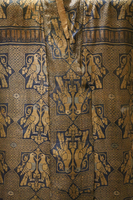Silk robe from Central Asia
Type:
Garments
Date:
Eleventh to thirteenth century
Medium:
Silk,
Silver or gold thread
Dimensions:
142 × 197 cm,
waist W 60 cm
Description:
This luxurious garment woven with gold-wrapped silk thread on a dark-blue ground depicts paired birds in medallions, with a band of stylized script (pseudoscript?) across the front. The eight-pointed medallions are separated by pointed-cross shapes, and both of these forms were used in Central Asian ceramic tiles. The front of the robe is in excellent condition, but because it was ultimately used to clad a dead body laid out on its back, the reverse has deteriorated.
Such complete robes are very rare and therefore difficult to date. They were high-status objects across Central Asia and highly prized in medieval Europe, where from the mid-thirteenth century they were called panni tartarici, Tartar (Mongol) cloths.
Such complete robes are very rare and therefore difficult to date. They were high-status objects across Central Asia and highly prized in medieval Europe, where from the mid-thirteenth century they were called panni tartarici, Tartar (Mongol) cloths.
Relevant Textbook Chapter(s):
7,
8,
9
Repository and Online Resources:
• The robe is in the collection of the Aga Khan Museum, Toronto (AKM816).
Image Credits:
Adam S. Cohen





